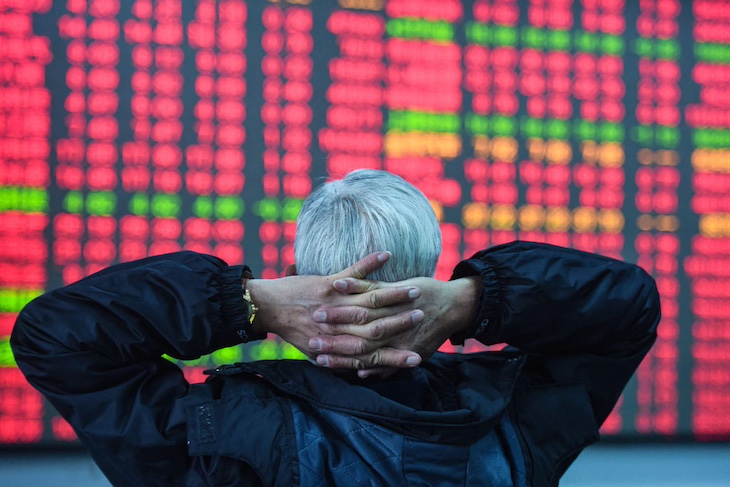China’s leaders and economic policymakers – who have been optimistic and confident about the economy for years – are clearly spooked.
Just two weeks ago, Chinese state media was happily insisting that the country was experiencing ‘stable economic growth’.
China requires a major rethink when it comes to the economy, something which may be politically impossible for a Leninist government
Yet in the last week, Beijing has announced and is expected to approve over £319 billion in new fiscal measures – the biggest monetary policy stimulus since the pandemic. The move is a clear acknowledgement that China has a weak economy with an array of systemic economic and social problems. In another sign that Beijing is deeply concerned about the economy, these measures were introduced at the Politburo’s September forum, which normally never considers economic issues.
The measures put forward comprise interest rate and mortgage rate cuts, along with reductions in the downpayments for second homes, additional help for state enterprises to buy unsold homes, and £85 billion to allow non-bank financial firms to buy equities, and for listed firms to buy back their own shares. A £106 billion bank re-capitalisation programme is also considered likely.
These measures are rocket fuel for the stock market, favouring the state enterprises and institutions that own a large proportion of Chinese shares. In response to the announced measures, China’s moribund stock markets have shot up, with 12 to 15 per cent gains in the biggest weekly moves in 15 years. The bigger question though is whether the government will succeed in fighting off deflation and restoring economic confidence in the longer term.
While these measures may bring about temporary relief, they will not really boost the economy. China’s economic problems are not due to interest rates being too high, a shortage of liquidity, or credit supply constraints. And China’s property market needs much more than patchy support after decades of overbuilding and a bursting real estate bubble.
That is potentially why the government is also reportedly going to announce a £212 billion borrowing programme around the Golden Week holiday in the first week of October. This money will be split roughly equally between measures to support consumption, and help to alleviate local government indebtedness.
The latter measures are expected to shift debt ownership from local to central government, something Beijing has previously railed against. Even so, this is more financial engineering than economic stimulus.
The consumption part of the upcoming measures, however, could have a more meaningful impact. There is the rumoured extension of a scheme which allows individuals and businesses to trade in consumer products and equipment for newer upgrades.
And, more significantly, there is the reported introduction of a monthly £85 child benefit payment for all but first children. This amount represents about 30 per cent of a median family’s post-tax monthly income, which could certainly give household consumption a shot in the arm.
A lot will depend on the details of these policies. But if these measures are effective, the government’s target of 5 per cent economic growth in 2024 may still be salvageable. Even so, while the stimulus measures announced so far will help to stabilise and even push up economic activity, the underlying trend is that China’s economy is persistently slowing down.
Part of the reason why is Xi Jinping’s focus on short-term and usually incremental boosts to the economy. These are necessary but by no means sufficient or even relevant when it comes to addressing the country’s systemic flaws.
The engines of China’s past economic growth – property, infrastructure and the expansion of the finance sector – are all spent forces now. China requires a major rethink when it comes to the economy, something which may be politically impossible for a Leninist government. It will involve considering demand management, distribution, inequality, access to social welfare, and the provision of public goods and services to more people, including the country’s almost 300 million migrant workers.
Instead, Xi Jinping’s economic strategy is focused on state-led industrial policy in which the private sector always plays second fiddle. There is a mercantilist preoccupation with exports. And too much time is spent fighting macroeconomic fires instead of re-engineering China’s economic model. If Beijing’s spooked government officials want to know the real reason that the Chinese economy is struggling, they should look no further than their own leader.







Comments